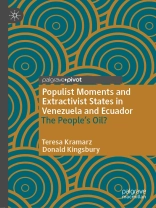This book addresses the intersection of extractivism, populism, and accountability. Although populist politics are often portrayed as a driver of poor environmental governance, Populist Moments and Extractivist States identifies it as an intervening variable at best – one that emerges in response to the accountability deficits of extractive states. Case studies in Venezuela – for many, the prototypical petrostate – and Ecuador – which exchanged agribusiness dependency for oil decades later – illustrate how extractive states are oriented by a colonial logic of export and service. This logic regulates state-society-nature relationships and circumscribes avenues for local stakeholders to hold public officials and extractive industries to account for environmental and human harms. Populist moments of the early 21st century across Latin America responded to these conditions, promising more equitable and sustainable futures. However, rather than reversing the technocracy, verticalism, and exclusion of the recent past, populist moments often intensified and legitimated them in the drive to maximize and distribute resource rents. The result has been cyclical, as populist moments of hope and rupture fall prey to the extractivist states they tried, and failed, to replace.
Inhaltsverzeichnis
Chapter 1: The People’s Oil?.- Chapter 2: The Limits of Populism as Causal Explanation.- Chapter 3: The Self.-Reinforcing Effects of the Extractive State.- Chapter 4: “The Devil’s Excrement”: Venezuela as the Prototypical Extractive State.- Chapter 5: The Citizen’s Revolution and the Failure of an Alternative Environmental Moment in Ecuador.- Chapter 6: Extractive States and Prospects for Environmental Action.
Über den Autor
Teresa Kramarz is Associate Professor in Global Affairs at the University of Toronto, Canada.
Donald V Kingsbury is Assistant Professor in Latin American Studies and Political Science at the University of Toronto, Canada.












